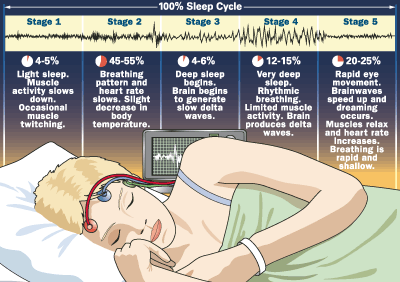Researchers are trying to solve the mystery: why should you sleep? While they are busy comparing the activity of different groups of cells in the brain during waking time, other groups try to bypass sleep and stretch the waking time as much as possible
Dr. Dina Zafariri, Galileo

Direct link to this page: https://www.hayadan.org.il/whysleeping.html
Many researchers engaged in the study of sleep are trying to solve the intriguing mystery: what is the purpose of sleep? Unanimity prevails among them only in the understanding that sleep is necessary for normal functioning of the mind and body and that lack of sleep can be fatal. However, while these researchers are busy comparing the activity of different groups of cells in the brain during waking time, in the deep sleep phase and in the phase of dream sleep characterized by rapid eye movements (REM), other groups of researchers are busy trying to bypass sleep and stretch the waking time as much as possible.
It's all chemistry
Like all human behavior, sleep is also dictated by chemical processes. It has been known for a long time that three chemical substances - neurotransmitters - are involved in the processes of sleep and wakefulness: serotonin, norepinephrine and histamine. Their level decreases with anesthesia and increases with awakening, and experts dealing with sleep used to bind them together on the assumption that they work together to cause awakening and do not work during the REM stage in order not to allow the body to move during the dream.
Only recently, in a study led by Jerome Sieggel, professor of psychiatry and behavioral sciences at UCLA, it became clear that their roles are different. The research was done on dogs with narcolepsy - an acute sleep syndrome that affects about 200,000 Americans. The pattern of signals in the dogs brain is similar to that of humans.
Vigorous dreams
While awake the levels of neurotransmitters are high and in deep sleep when the dreams are especially vigorous, they decrease. One of the strange symptoms of narcolepsy, in addition to the feeling of general drowsiness, is a sudden collapse due to loss of muscle tension, as a result of which the patient lies paralyzed while fully conscious.
This phenomenon is called cataplexy, a kind of paralysis, and is actually a mirror image of the behavior syndrome of the REM phase, which causes people to carry out the actions that appear in the dream - a phenomenon that can end up causing harm to the dreamer himself or to his sleeping partners. These pathological conditions made it possible to distinguish between the roles of the three transmitters. Examining the brains of the dogs in the cataplexy phase revealed that the histamine cells are in a state of arousal.
Meet the hypocretin
The cells that produce and secrete histamine are located in the back of the hypothalamus above the pituitary gland. Another transmitter, hypocretin, is the one responsible for the increase in the histamine level. Dr. Siegel hypothesizes that damage to the cells that secrete hypocretin causes a chronically low level of histamine concentration in narcolepsy patients.
Those who suffer from insomnia, on the other hand, are "cursed" with excess histamine. Hence, in those with narcolepsy and REM phase syndrome, there is a separation between the action of histamine, which is responsible for states of wakefulness/sleep, and the other two transmitters, norepinephrine and serotonin, which are responsible for "silencing" the body during the dream phase as a result of relaxation of muscle tension.
Cure for insomnia
Finding a drug that blocks the activity of histamine, according to him, can solve the problems of those who suffer from insomnia. The medicines against allergies and colds contain antihistamines, which lower its concentration, so taking them causes drowsiness. According to Dr. Peter Shiromani (Shiromani), a neurologist from Harvard, recognition seems to depend on the activity of histamine neurons.
And histamine is the best solution for people who want to stay awake. Stimulants such as amphetamines, which release norepinephrine and dopamine, cause addiction, while the effect of coffee wears off faster and causes nervousness - therefore, according to Dr. Shiromani, histamine is the ultimate answer for those fighting fatigue.
(20.09.04, 08: 23)
https://www.hayadan.org.il/BuildaGate4/general2/data_card.php?Cat=~~~960314042~~~58&SiteName=hayadan
